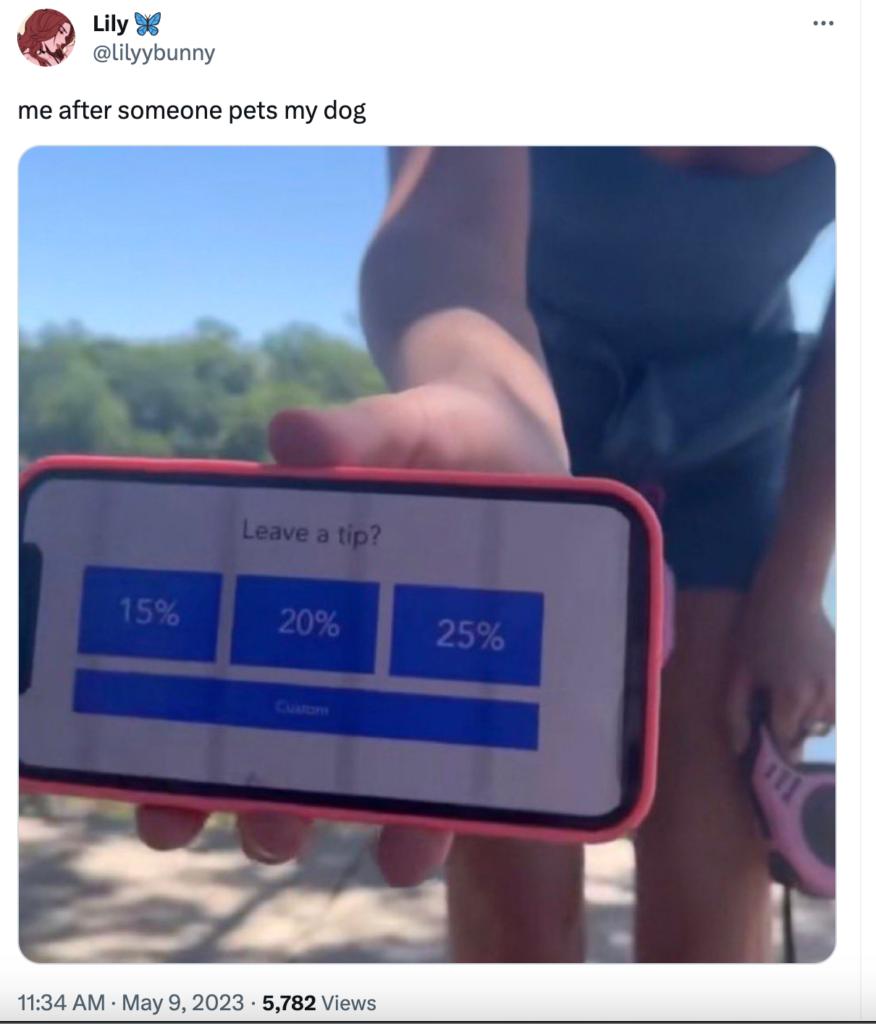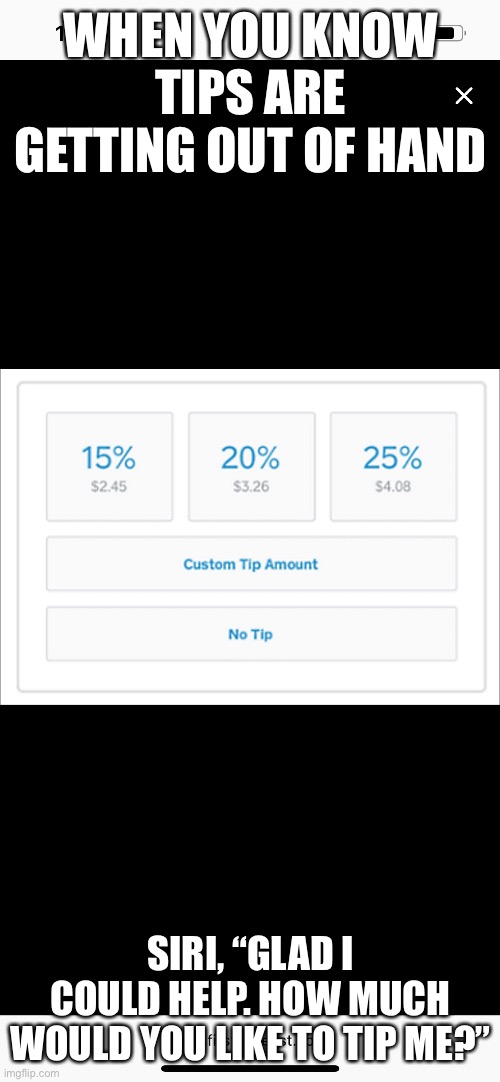Online communities, it seems, have a special way of talking about things that bother us, or perhaps just make us chuckle. This happens a lot with shared jokes and ideas that spread like wildfire across the internet. These bits of cultural information, you know, they get passed around, sometimes changing a bit along the way. They often capture a moment or a feeling that many people can relate to, or at least have some sort of opinion about. It's how we sort of make sense of things, or at least how we express our feelings about them, in a rather public space.
One topic that has really gotten people talking, and sharing these quick, funny pictures or phrases, is the whole idea of tipping. It's something that, for many, used to be pretty straightforward, but it feels like it's gotten a bit more complicated lately. People have lots of thoughts on it, and those thoughts often turn into these widely shared online tidbits. So, it's almost like everyone has an opinion, and they are not shy about letting it be known, particularly when it comes to the expectation of leaving a little extra money for someone who provides a service.
You see these little pieces of shared culture popping up everywhere, especially when someone feels a certain way about being asked for a tip. It's a way for folks to voice their frustrations, their confusion, or even their humor about this practice. Whether it is a barista spinning a screen around or a cashier waiting for a sign of appreciation, these moments get captured and turned into something people can react to. It’s a pretty common sight, actually, and it really gets people chatting.
Table of Contents
- What's the Big Deal with Tip Memes?
- The "iPad Tip" Phenomenon
- Why Do We Even Talk About Tip Memes?
- Is Tipping Culture Really Spreading?
- Personal Views on the Tip Meme Debate
- When Does a Tip Meme Go Too Far?
- The Online Communities and Tip Memes
- Understanding the Tip Meme Sentiments
What's the Big Deal with Tip Memes?
You might be wondering, what exactly is it about these "tip meme" moments that gets everyone so worked up? Well, it seems to stem from a feeling that the expectation of giving a tip has, in some ways, gone a bit too far. People are sharing these bits of content because they capture a general unease, perhaps, with how often they are being prompted to give extra money. It's a way of saying, "Hey, does anyone else feel this way?" and finding out that, yes, many others do. The shared experience of being asked to tip in what feels like new or unexpected situations often leads to these online discussions, and then, you know, the creation of these shared jokes.
For instance, some folks mention that they really do not feel the need to offer a tip for a simple cup of coffee. If it is a huge order, or something that took a lot of effort, then sure, that is different. But for just a regular, commonly ordered coffee, they feel that an extra payment is not really necessary. This kind of sentiment, which is quite common, finds its voice through these shared images and sayings, making the "tip meme" a pretty relatable thing for a lot of people. It is a simple way to express a somewhat complex feeling about everyday financial interactions, actually.
The "iPad Tip" Phenomenon
One particular example that comes up quite a bit is the "iPad tip" scenario. This is where a cashier or a barista turns a screen around, and you are prompted to select a tip amount. It is also known as "iPad tipping" or "the barista waiting for iPad tip." This specific action, this turning of the screen, has become a sort of visual shorthand for the broader debate about when and where tipping is expected. It is a moment that many people experience, and it clearly sparks a lot of discussion. The awkwardness, or perhaps the perceived pressure, in that moment, is what makes this kind of "tip meme" so widely recognized and talked about.
This particular kind of "tip meme" highlights a specific point of friction for many. It is not just about the act of tipping itself, but the way it is requested, or even, in a way, demanded. The visual of someone waiting for you to make a choice on a screen, often with them standing right there, creates a certain kind of feeling. This feeling, which can be a bit uncomfortable for some, is exactly what these online jokes capture and spread. It is a rather specific situation, yet it speaks to a much wider point about changing social customs around payments.
Why Do We Even Talk About Tip Memes?
People talk about these "tip meme" bits because they are a reflection of real-world changes and differing opinions on money and service. It is a way for individuals to share their experiences and feelings without having to get into a really deep discussion face-to-face. Online spaces, like various discussion forums, are pretty good for this kind of shared venting or humorous observation. You see these comments popping up, and it is clear that people want to discuss this stuff. They want to know if their feelings are shared, or if they are alone in thinking certain things about tipping.
For instance, there is talk about how some things, like the idea of a "landlord tipping" scenario, are just jokes, and some people get a bit confused about why others take them so seriously. This shows that the purpose of these online bits can sometimes be misunderstood. Some are clearly meant to be funny, while others highlight genuine frustrations. So, the conversation around these "tip meme" elements is not just about the humor; it is also about trying to figure out what is real, what is a joke, and what it all means for how we interact with businesses and service providers, basically.
Is Tipping Culture Really Spreading?
Many people feel that the practice of giving extra money is, in fact, showing up in more and more places. It is something that used to be quite specific to certain types of service, but now it seems to be everywhere. This feeling of it "creeping in" is a common theme in the discussions you see online. For example, in places like Australia, where giving extra money was not a part of the usual way of doing things, people are now seeing prompts for it when they pay with a card. This kind of shift really gets people talking, and it often leads to the creation of more "tip meme" content, too it's almost like a shared cultural observation.
This expansion of the practice leads to a lot of questions about what is expected and what is fair. People wonder if businesses are relying on customers to pay their staff, rather than paying them a living wage themselves. This underlying concern often fuels the discussions around these shared jokes. It is not just about the small amount of money, but the larger idea of how people are paid for their work. So, when people share a "tip meme," it can often carry a deeper message about these broader economic shifts, or at least, that is how it feels for many.
Personal Views on the Tip Meme Debate
When you look at what people are saying, there is a whole range of personal thoughts on this subject. Some folks, for instance, say that if you cannot afford to give extra money, then you should not eat out or use a service where it is expected. This is a pretty firm stance for some. However, others, like those who have worked for tips, feel a strong connection to the practice. They know what it is like to rely on that extra money, and they feel a sense of duty to support others in similar situations. This means they often give extra money with a lot of conviction, actually.
Then you have people who feel quite strongly against the whole practice, describing it as something they "hate so much." Yet, even these people often say they will still give extra money because they feel that businesses put the burden of paying staff onto the customers. It is like they feel forced into it, even if they disagree with the system. This creates a kind of internal conflict that many people experience, and it is a big part of why these "tip meme" conversations get so much attention. It is a bit of a tricky situation for everyone involved, you know.
When Does a Tip Meme Go Too Far?
Sometimes, what starts as a funny observation can get a little out of hand, or at least, some people feel that way. There are discussions where a joke about something, like the "landlord tipping thing," is taken very seriously by some, even though it was meant to be lighthearted. This shows that the line between humor and genuine concern can get a bit blurry in online spaces. What one person finds funny or satirical, another might interpret as a serious suggestion or a sign of something truly wrong. This difference in interpretation can sometimes make a "tip meme" seem to cross a line for some people.
There is also the question of context. Some people will give extra money if they are being waited on and served, but they will shake their head at the idea of being asked for it when they are just picking up an order to go, or at a fast food place. They feel that is just "crazy." This kind of feeling, where the expectation of giving extra money feels out of place, can make people react strongly. So, a "tip meme" that hits on this specific kind of frustration can resonate very deeply with many people, and sometimes, that resonance can push the conversation into a more serious territory than perhaps intended, basically.
The Online Communities and Tip Memes
These discussions about "tip meme" content often happen within very large online groups. For example, there are communities with tens of millions of members, all sharing and reacting to these cultural bits. These spaces are where people go to find others who think like them, or to just see what is making others laugh or groan. It is a collective experience, in a way, of processing shared frustrations or amusement. These groups provide a platform for these quick, funny images and phrases to spread very, very quickly, reaching a huge number of people in a short amount of time, too it's almost incredible.
You also find more specific groups, like those focused on particular interests, where these kinds of shared jokes also pop up. For instance, a community centered around a specific online game might have its own funny takes on things, and sometimes, these general cultural points, like the idea of giving extra money, get woven into their specific humor. These specialized groups often have their own internal jokes and ways of judging what is considered funny or not. So, the "tip meme" might take on a slightly different flavor depending on which online group you are looking at, you know.
Understanding the Tip Meme Sentiments
When you look at all the different feelings expressed through these shared online bits, it is clear that people have a lot on their minds about the act of giving extra money. There is the person who tips fiercely because they used to rely on that income themselves. They understand what it is like to be left without what they earned, after working hard. This personal experience shapes their view and makes them very supportive of the practice. So, their "tip meme" perspective comes from a place of deep personal history, which is pretty interesting.
Then there is the person who sees the funny side, even if they disagree with the practice. They might find a "tip meme" funny because it highlights the situation of cashiers who, in their view, already make a decent hourly wage. This perspective suggests that the humor comes from a perceived disconnect between the expectation of extra money and the actual pay structure. It is a way of using humor to point out what they see as a bit of an odd situation. So, the "tip meme" serves as a way to express these varied, and sometimes conflicting, feelings about an everyday social practice, honestly.
Related Resources:



Detail Author:
- Name : Khalid Reichert
- Username : nora53
- Email : benjamin60@howe.com
- Birthdate : 2003-01-25
- Address : 85738 Quitzon Port Daisystad, FL 96279
- Phone : (959) 855-8106
- Company : Mayert, Hirthe and Gutmann
- Job : Agricultural Crop Worker
- Bio : Cum consequatur harum eos nobis ut eligendi. Doloremque qui reprehenderit voluptatem est maxime impedit omnis. Laboriosam et corporis vitae sit cupiditate. Quae aut qui sed natus.
Socials
linkedin:
- url : https://linkedin.com/in/fletchergrant
- username : fletchergrant
- bio : Amet quia et facilis aut quam fugit modi.
- followers : 1622
- following : 2904
tiktok:
- url : https://tiktok.com/@fletchergrant
- username : fletchergrant
- bio : Non ratione minima dolore. Quo in qui sit in sit et nostrum.
- followers : 4941
- following : 2173
facebook:
- url : https://facebook.com/grantf
- username : grantf
- bio : Totam est corrupti qui libero saepe rem.
- followers : 1268
- following : 1035
instagram:
- url : https://instagram.com/fgrant
- username : fgrant
- bio : Sunt aut quidem atque ab. Nostrum omnis omnis quis aut sunt ab corporis.
- followers : 4570
- following : 201
twitter:
- url : https://twitter.com/fletcher.grant
- username : fletcher.grant
- bio : Eligendi quod necessitatibus repudiandae. Pariatur voluptatem sunt ut itaque.
- followers : 5533
- following : 1546